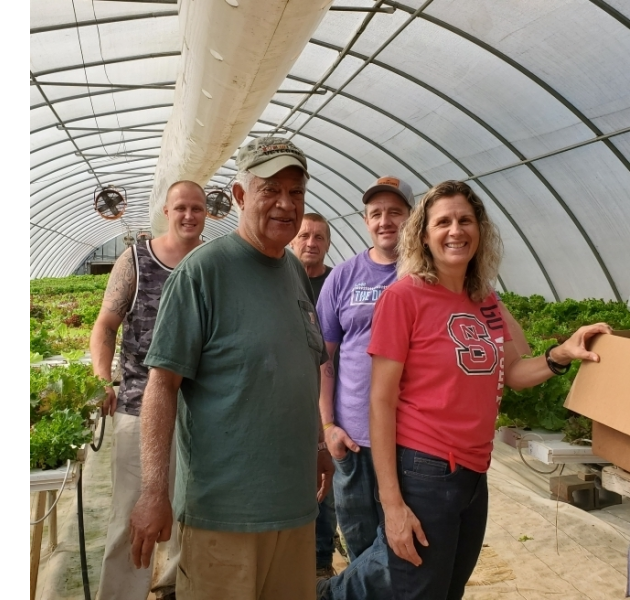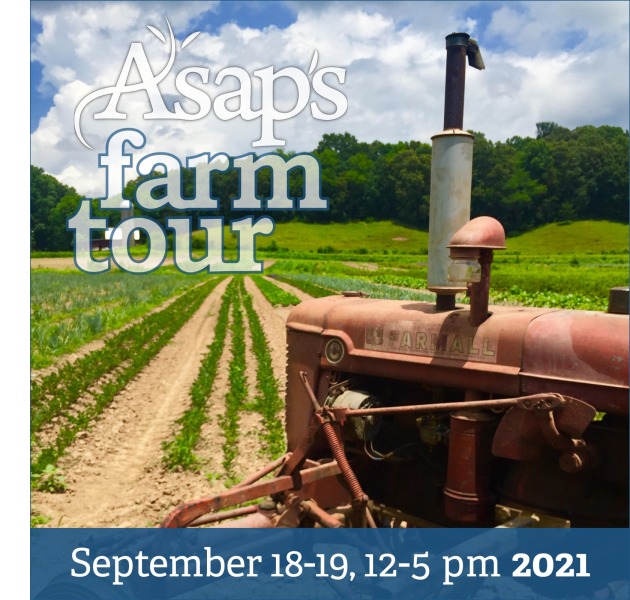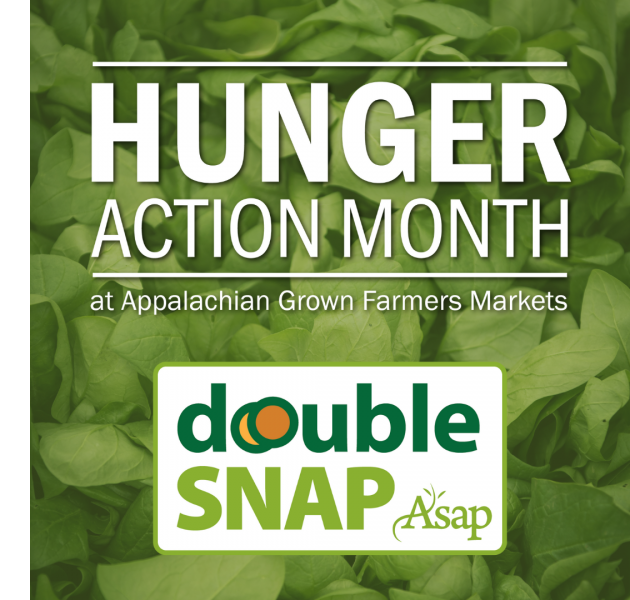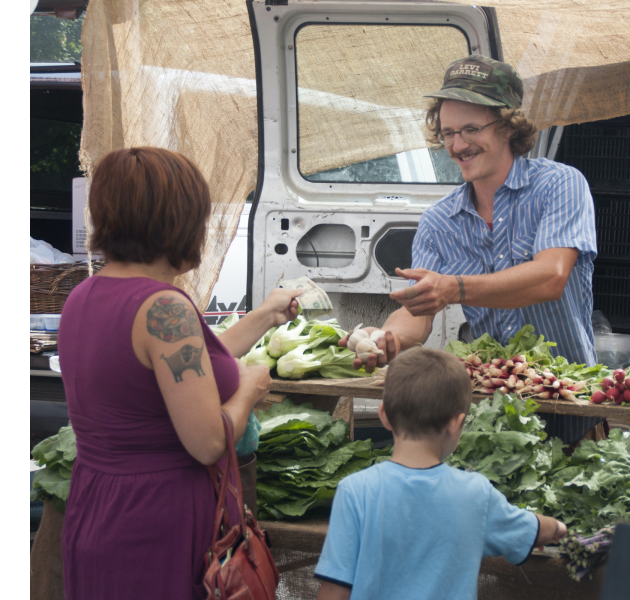|
|
|
monthly news from ASAP | AUGUST 2021 | asapconnections.org
|
| |
|
|
Appalachian Grown Farmer Relief Fund
|
Many farms in the Appalachian Grown region are grappling with enormous loss due to sudden and severe flooding from Tropical Storm Fred. Some farms have lost crops for the rest of the season. Some have lost equipment, animals, or even homes. You can support them directly by donating to the Appalachian Grown Farmer Relief Fund.
ASAP launched the Appalachian Grown Farmer Relief Fund at the start of the pandemic to provide immediate needs grants to help farmers respond quickly. We're expanding the scope to cover natural disasters and other emergencies, including this most recent storm. Immediate needs grants can help farmers buy fall starts to replant lost crops. They can pay for a generator to keep a cooler going to preserve what was harvested. They can rent the dumpster needed to get rid of debris and contaminated plants.
|
|
 |
Appalachian Farms Feeding Families Program Expands
|
 ASAP is expanding the Appalachian Farms Feeding Families program, thanks to a $500,000 grant from Blue Cross and Blue Shield of North Carolina Foundation. This program—started by ASAP during the pandemic—pays farmers to grow and deliver fresh fruits and vegetables directly to food relief sites and childcare centers in their own communities. The funding from Blue Cross NC Foundation will double local food purchasing through the program as well as allow ASAP to add new sites and farms. ASAP is expanding the Appalachian Farms Feeding Families program, thanks to a $500,000 grant from Blue Cross and Blue Shield of North Carolina Foundation. This program—started by ASAP during the pandemic—pays farmers to grow and deliver fresh fruits and vegetables directly to food relief sites and childcare centers in their own communities. The funding from Blue Cross NC Foundation will double local food purchasing through the program as well as allow ASAP to add new sites and farms.
We're now partnering with 56 sites and 47 farms, working in 22 WNC counties. (Pictured is farmer Eugene Jones of Farm Fresh Ventures with staff from Foothills Food Hub.) Appalachian Farms Feeding Families serves a dual purpose to both improve the quality and variety of fresh produce available to families who need assistance and create new market opportunities for farms that have lost restaurant and other sales due to COVID-19.
Read more about the impact of Appalachian Farms Feeding Families in the Faces of Local interview with YWCA nutrition coordinator Melinda Aponte below.
|
|
 |
Volunteer for ASAP's Farm Tour, Sept. 18-19
|
 ASAP's Farm Tour is next month! Get a unique view of farm life by volunteering. We need volunteers both Saturday and Sunday, Sept. 18-19. ASAP's Farm Tour is next month! Get a unique view of farm life by volunteering. We need volunteers both Saturday and Sunday, Sept. 18-19.
The Farm Tour is a chance to experience diverse farms in the region through guided tours, tastings, and hands-on activities. As a volunteer, you spend one afternoon, from 12–5 p.m., welcoming visitors at a participating farm and in exchange receive a free tour pass (good for everyone in your car) to visit farms on the day you aren’t working. Volunteering is a great way to connect with a local farm, make new farm friends, and meet people from across the region!
|
|
 |
Hunger Action Month at Appalachian Grown Farmers Markets
|
 September is Hunger Action Month and Appalachian Grown farmers markets across the region are connecting communities with resources and raising support for neighbors in need. Check with your local market to see if there are ways you can participate or contribute, or consider a donation to ASAP's Double SNAP program. For every dollar a shopper spends on their SNAP/EBT card, we give them twice that amount to shop at participating farmers markets. September is Hunger Action Month and Appalachian Grown farmers markets across the region are connecting communities with resources and raising support for neighbors in need. Check with your local market to see if there are ways you can participate or contribute, or consider a donation to ASAP's Double SNAP program. For every dollar a shopper spends on their SNAP/EBT card, we give them twice that amount to shop at participating farmers markets.
Double SNAP helps our neighbors stretch their food budgets and feed their families fresh, healthy foods. Plus, every dollar you donate is doubled not only for a family in need but also as income for a local farmer or food vendor at your market!
As demand for this program grows, we need to double down on our efforts to raise funds to sustain it. We’re inviting you to take action this Hunger Action Month. Please donate today and sustain this vital program!
|
|
 |
Local Food Research Center: 'Experiencing Local'
|
 A new report from ASAP's Local Food Research Center presents findings from a multiyear project investigating the impact of place-based food and farm experiences in building a local food system in Western North Carolina. The research shows that direct experiences with local food and farms are, indeed, a powerful way to cultivate interest in food and food production, instill a concrete sense of community belonging, and activate engagement with the region’s evolving food system.
Farmers markets and farm tours provide social spaces where participants interact and learn about farming and gain ideas, knowledge, and inspiration for cooking with and eating fresh seasonal foods. Inspired by their experiences, participants alter their lifestyles to engage more with local farms and food and act as advocates for farmers markets, farms, local products, and local food production more broadly with friends, family, and others in their social spheres.
|
|
 |
Three new staff members joined the ASAP team this month!
Hannah Furgiuele (pictured left) joins ASAP as a Local Food Campaign program coordinator. Most recently, Hannah was the program manager for OLLI at UNC Asheville's Leadership Asheville Seniors Program, where she led community engagement initiatives to connect with critical issues in Asheville and Western North Carolina.
Larissa Lopez (pictured center) is also a Local Food Campaign program coordinator. She brings experience as an administrator for LEAF Community Arts, coordinator for the U.S. team for the Institute for Sustainable Communities, and, most recently, as an independent consultant offering administrative and logistical support to nonprofits and other organizations.
Erica Shanks (pictured right) is our new events coordinator. In 2014, Erica was ASAP’s Farm Tour intern! For the past seven years, she has worked with the Polk County Ag Economic Development Office, including managing the Foothills Farm Tour and farmers markets in Saluda and Columbus.
|
|
 |
 FACES OF LOCAL FACES OF LOCAL |
| |  ASAP likes to share the stories of people who help us fulfill our mission. This month we talked with Melinda Aponte, nutrition coordinator for the YWCA of Asheville’s Early Learning Program. The YWCA is part of ASAP’s Appalachian Farms Feeding Families program, working with Ivy Creek Family Farm to provide fresh, local produce for the children. She is pictured on the left with farmer Anna Littman of Ivy Creek. ASAP likes to share the stories of people who help us fulfill our mission. This month we talked with Melinda Aponte, nutrition coordinator for the YWCA of Asheville’s Early Learning Program. The YWCA is part of ASAP’s Appalachian Farms Feeding Families program, working with Ivy Creek Family Farm to provide fresh, local produce for the children. She is pictured on the left with farmer Anna Littman of Ivy Creek.
What are some examples of farm to cafeteria activities you have participated in with the students?
Pre-COVID we’ve always done Farmers Market Friday, which is a huge part of my nutrition program. I go to each classroom and introduce different veggies and fruits in their natural state, uncooked, so the children get familiar. I find it so much easier to work with children. They’re so much more adventurous than adults, especially when their friends are trying it. I ask them, “What does it taste like? What are the colors?” I want to get them involved. The more you allow them to make it their own, the more they’re open to new flavors.
Why do you think it’s important for children and families to be connected to local food and farms?
Why isn’t it? That’s the question. Teaching children about food goes hand in hand with the mission of the YWCA: “Eliminating Racism, Empowering Women, and Promoting Peace, Justice, Freedom, and Dignity for All.” But in addition to that, with local food we’re bringing down our carbon footprint and giving these kids more nutritional bang for their buck by eating local and seasonal food. Fresh vegetables and fruit provide a foundation to promote lifelong health and wellness.
How has your role as Nutrition Coordinator changed the food environment at your school?
It changed drastically. I’ve been here six years now. My background is as a chef in New York and also in the private school sector. When I came to the YWCA, a lot of food was canned. Now we do almost everything from scratch, which was a great evolution. Also, I teach the people I work with to take ownership of what they make for the children. We look at it as if we are feeding our own children. With cooks, when you’re having a good day, that same sandwich that you’ve made a thousand times, it’s the best ever. I want our staff to be conscious of the energy we put into the food. What we do here is intentional. Everything we do matters. We’re an integral part of the children’s learning experience.
Can you talk about how your relationship with Ivy Creek Family Farm has developed through the Appalachian Farms Feeding Families program?
Before COVID I was trying to connect with local farmers, then COVID happened and that disappeared. I was so excited when I got the email from ASAP and was connected with Anna [Littman of Ivy Creek Family Farm]. It’s just been fantastic. By working with a farmer over time, seeing the farmer, you get that personal connection. They understand what you are cooking, for how many, and what are your future goals. You understand what they’ve planted when it’s going to be in season. That communication is huge. I get to talk to Anna when she delivers. I love to tell her what we’re making. I told her I wasn’t going to throw out those beautiful beet greens—no I’m sautéing those bad boys. I use every part of the vegetable that’s edible because I want the children to have the most nutritious meals. Some of these children don’t have access to these veggies at home. It just fills my heart to know that the meals we provide are excellent.
What local produce are you getting right now and what types of recipes do you make for the students?
Right now our bounty is lots of leafy greens. We’re sautéing greens, making soups, and making pesto. Anna brought me a huge amount of greens. She wasn’t sure if we could use all of it, but it was gone in two days. The children eat everything we send.
Can you share a favorite experience with us?
In addition to our Early Learning Program, we also offer Empowerment Childcare, and a lot of those babies are experiencing homelessness, have parents in school, or could be transitioning from foster care. We overheard one parent ask, “What did you do today?” “We had veggies. They were green and they tasted good.” My co-worker and I just looked at each other like, “Did she really just say that?” My co-worker started crying. We knew what that meant. We’re accomplishing what we set out to do.
|
|
|
|
 RECIPE OF THE MONTH RECIPE OF THE MONTH |
| Roasted Okra and Cherry Tomatoes
|
|  For our recipe this month, we asked Melinda Aponte to share one of the dishes she makes for the children at the YWCA. She shared several, including this delicious way to get kids to try okra! For our recipe this month, we asked Melinda Aponte to share one of the dishes she makes for the children at the YWCA. She shared several, including this delicious way to get kids to try okra!
Ingredients
- 30 fresh okra, cut into 1-inch pieces, or more to taste
- 6 cherry tomatoes, quartered, or more as desired
- 2 tablespoons extra-virgin olive oil, or as needed
- kosher salt to taste
- 4 slices cooked bacon, crumbled
- 1 teaspoon minced garlic
- 2 tablespoons grated Parmesan cheese, or more to taste
Directions
- Preheat oven to 350 degrees F (175 degrees C).
- Combine okra and tomatoes in a bowl. Drizzle enough olive oil over okra mixture to coat; toss and season with salt. Mix bacon and garlic into okra mixture and transfer to a baking dish.
- Bake in the preheated oven until okra is tender, about 40 minutes. Sprinkle Parmesan cheese over okra mixture and bake until cheese melts, about 5 minutes more.
|
|
|
|
PHOTOGRAPHER SPOTLIGHT |
|
Our August photo of the month comes from Glenda Ploeger of Cane Creek Asparagus & Co. CSA. It's peak season across the mountains, with new crops debuting every week. Get out to your closest farmers market, farm stand, or restaurant sourcing local food! Find them at appalachiangrown.org.
|
|
|
|
 MEDIA HIGHLIGHTS MEDIA HIGHLIGHTS |
| “Farms are directly able to serve the communities they call home. The [Appalachian Farms Feeding Families] program allows them to deliver higher volumes and greater diversity.”
—ASAP Local Food Campaign Program Manager David Smiley, quoted in the Mountain Xpress
"Folks that don’t live in a rural area get an opportunity to see a lot of different views of farm life," says Jeff Frisbee, a fourth-generation farmer at Addison Farms Vineyard and Winery. “It’s a great experience for somebody whose biggest interaction with food is at the supermarket. That cellophane-wrapped ribeye didn’t happen in the back of the supermarket; it’s happening out here at the farms."
"When the pandemic challenged meat production, tourism became the farm’s unlikely savior. The property boasts 10 different campsites, all primitive, that are reservable through Hipcamp. Though some guests use the property as a home base for other adventures, most spend their time just hanging out on the farm or enjoying the river."
—Smoky Mountain News featured ASAP's Farm Tour and participating farm Smoky Mountain Mangalitsa
"Area schools are opening to in-person classes, but teachers and students alike benefit from outdoor lessons as well, and the Appalachian Sustainable Agriculture Project’s Growing Minds Farm to School program is here to help."
—Mountain Xpress featured free seeds for school gardens from ASAP's Growing Minds Farm to School program |
|
|
|
|
|
|
| | |
ASAP's mission is to help local farms thrive, link farmers to markets and supporters, and build healthy communities through connections to local food.
|
|
|
|
|
|
|
|
|
|
|